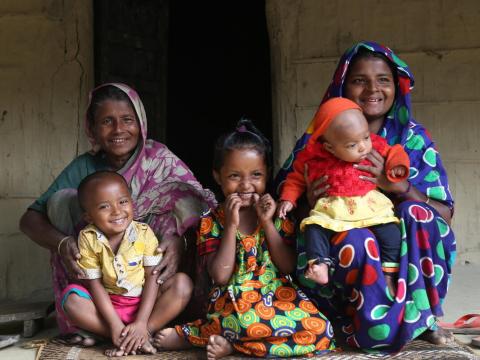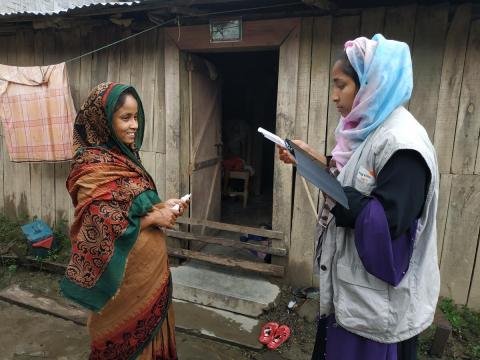
COVID-19: Invest now in cash/voucher-social protection scale-up or children pay the price later
By Dr. Kathryn Taetzsch, Global Director, Humanitarian Cash & Voucher Based Programming, World Vision
Despite cash and voucher transfers becoming the tool of choice of social protection scale-up called for by UNSG as part of the UN COVID-19 Global Humanitarian Response Plan (GHRP) over recent months, it seems there has been little thought given to how social assistance and humanitarian cash/voucher transfers are programmed in complementarity; how to effectively support all the most vulnerable people in a timely and quality service-fashion. The World Bank estimates that Cash/voucher transfers account for over 50% of Government social protection mechanisms during the current crisis; reports indicate that 190 countries scaled up existing social protection, especially social assistance transfer programmes, in response to the pandemic.
Yet, many governments struggle to provide the fastest and widest response to meet household needs through their own formal social protection systems. In these instances, the most vulnerable groups, such as internally displaced refugees and migrants, may not be able to access social protection, due to lack of legal documentation, or because of other factors aiding to their marginalised status, including gender, level of education, living with disabilities, or socio-economic status. Often, these groups are simply unaware of their rights and therefore often inadvertently excluded from assistance that may aim to address their needs. In some cases, government policies are ill-implemented and de-facto do not target all sub-categories of most vulnerable groups. We are currently experiencing first-hand how this limited focus can result in immediate and dire impacts on vulnerable children, especially those living in fragile contexts.
Even before the pandemic struck, 385 million children, or one in five children, were in extreme poverty (less than $1.90 a day) and 689 million, or almost one in two children, were living in poor households. As a result of the pandemic, an estimated 86 million more children could fall into financial poverty by the end of this year. With over 1 billion children in 130 countries not able to access school education due to the crisis, UN data indicates the reality that child labour is substantially increasing due to loss of household incomes, especially been seen in Lower-Income-Countries.
NGOs like ours continue to play a key role in supporting most vulnerable children that are and will be impacted most in the near future by COVID-19 secondary effects such as poor health, risk of violence and abuse, as well as education and exploitation due to the public health and socio-economic deterioration of household incomes. As humanitarian and development professionals we must look at filling the necessary gaps, by providing not only immediate humanitarian financial assistance, but look to guide and support national governments in their (child-sensitive) Social Protection transfer mechanisms.
Ensuring success through social accountability
Creating a pathway from and complementarity between humanitarian cash, voucher programmes to longer-term government-led Social Protection assistance supports strengthening the humanitarian-development nexus and overall resilience and social cohesion. This, however, can only be effective if underpinned by community-led social accountability. Where government-led Social Protection mechanisms are being implemented, World Vision is currently strengthening social accountability with communities and children by facilitating constructive dialogue between local governments and communities to improve both the quantity and quality of basic social services. In the past three years in Bangladesh, for example, World Vision has used its social accountability methodology, Citizen Voice and Action, to ensure wider access to government safety nets by those in need, especially women and the most vulnerable in Bangladesh. It was the first project of its kind to assist vulnerable community members, including ethnic minorities, to understand their entitlement to the social protection payments provided by the Bangladesh Government. Through social accountability facilitation, those receiving information about the safety nets to which they were entitled, including pensions, disability allowances and child-focused social assistance, increased from 15% at the start of the project to 83% at the end of the project. Target beneficiary numbers accessing the Government’s SSNP at the start of the project were as low as 5%, whereas at the end 74% of beneficiaries had accessed and benefitted from the Governments SSNP due to Citizen Voice and Action project community empowerment activities, the European Union funded EVPRA project and other initiatives. The project demonstrates that even if government officials intend to reach the most vulnerable, they can often miss their intended target for relief due to administrative complexity or corruption. Ensuring the recipients of social protection have the information they need and a say in cash and voucher transfer support as well as additional services reaching them, guides government efficiency and effectiveness in resource allocation. The Government’s Social Protection Programmes’ scale up is currently also being complemented by World Vision Bangladesh’s Multipurpose Cash Assistance to address COVID-19 related needs. A total of US$ 538,488.3 was transferred via mobile money (bKash) to over 66,145 people in Bangladesh, benefitting 26,722 most vulnerable children in 14,699 households between April and June 2020 alone.
Globally, since the COVID-19 response started in March 2020, within three months, World Vision has distributed over US$ 14 million through Cash and Voucher enabled programmes reaching the most vulnerable around the world.
Leveraging financial and digital enablers for the most vulnerable
Agility with timely response to emerging needs in complex crises and times of uncertainty is critical as shown in the Philippines, where World Vision, in partnership with local government and private sector through multipurpose cash with mobile feedback mechanisms in April and May 2020 supported 15,000 families from select-cities and provinces. In my experience, effective impact through innovative approaches and quick action by key stakeholders accelerates and leverages synergies to help those affected worst. Swift adaptation to ensure a conducive environment – e.g. through changes to regulatory frameworks - are a fundamental enabler in this process. This was demonstrated by the Government of Kenya, where digital money transactions are a core component of daily business and inter-personal financial transactions in the country. At the beginning of the country’s COVID-19 lockdown in March 2020, the government quickly enacted national guidance to financial service providers and mobile service providers to reduce or waive mobile money and transaction-related fees – reducing required inter-personal contact and extra costs. This enabling policy framework facilitated World Vision Kenya’s COVID-19 response support to the most vulnerable households in the informal settlements of Nairobi, Mombasa, Kisumu, Kilifi and Kwale through multipurpose cash assistance. By engaging with the community leaders, faith leaders and local administration and through Safaricom telecommunication services and mobile money (m-pesa) platforms, World Vision Kenya was able to rapidly identify and provide cash assistance to the most vulnerable. By mid-May, for example, 3,000 people from Changamwe, an informal settlement in Mombasa, received total cash transfers amounting to US$ 30,532. This complements the GoK Social Protection scale-up to most vulnerable population. As part of monitoring and evaluation, a virtual Post Distribution Monitoring continues to be conducted to obtain feedback from those benefitting from cash transfers to help improve the service delivery and identify any protection issues. Integrating a feedback mechanism is fundamental, to ensure community members are accessing basic humanitarian assistance from NGOs, UN as well as social services from Government – effectively - and holding state actors accountable for their decisions. Our data shows that the money accessed paid for urgent essential items and services, including hygiene and food items, rental costs, medical expenses or provided necessary economic support to vulnerable families whose only income - micro/small businesses – had been on the brink of closure.
Financial inclusion has also been a priority for World Vision in Bangladesh, where the majority of people living in ultra-poverty owned a mobile phone, but most were not registered with bKash, a mobile financial service in Bangladesh that offers the ability for immediate cash assistance. As part of its COVID-19 response, World Vision Bangladesh is interlinking humanitarian and development programmes with long term strategies to substantively address vulnerabilities and immediate needs of the most affected community members. In its commitment to tracking and monitoring for improved performance, on the ground teams used World Vision’s registration and tracking/ monitoring mechanism Last Mile Mobile Solution (LMMS) to capture impact. This was a new technology for many of the World Vision Bangladesh staff who are working in some of the most challenging areas and where efforts were further hampered by poor network conditions and COVID-19 related movement restrictions. By implementing this technology, and providing bKash registration guidance to families, this investment proved to be highly valuable to our work, providing the flexibility of context-appropriate and cost-efficient client-focused tools and ensuring agile, people-centred responses towards the wellbeing of most vulnerable children and their families. World Vision’s approach has created innovative partnerships that span beyond government and humanitarian response, bringing together other providers that enable further empowerment and shock-resilience for communities at large, such as community savings and loans groups, credit and micro-insurance, and financial literacy training to small businesses.
It is evident that the pandemic has triggered and will evolve into further multi-dimensional challenges that threaten the immediate and long-term well-being of children, especially the most vulnerable. When done right and done well, cash and voucher assistance puts people at the centre of any humanitarian response, ensuring that those excluded from digital and financial opportunities, can effectively access, use and make their own life-defining decisions for the best of their children and families. Yet, this area remains dramatically underfunded, with pledges slow to come through due to traditional donor countries grappling with their finance substantive stimulus and social protection packages for their population and economies.
If there is no substantive investment now, we will pay the price later resulting in devastated economies, dramatically impoverishing already vulnerable communities and the future of their children.
